Change Language :
Test reports of the control cable
Discover all the durability test reports for our control cables here.
Control cable CF880.10.12
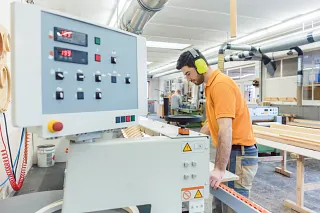
Using the CF880 in practice
A control panel for a saw or other woodworking machine always sounds like a simple application. In principle it is, but reliability is the be-all and end-all here, because every function of the machine is affected at this point. The radii found here are often larger and in the area of wood or other building materials, the PVC jacket of the CF880 is very well suited with its good abrasion properties against the dry dust. Such systems are often installed worldwide and therefore require not only a reliable service life but also UL approval.
Control cable CF881.15.12
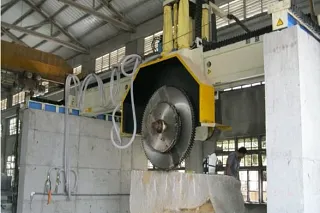
Using the CF881 in practice
Where stones used to be processed with other stones in manufacturing technology, today they are processed on industrial production lines using machine tools. Sawing and milling machines, gang saws or block saws are frequently used in stone processing. The control cables used in the energy chain are exposed to fine dust, vibration, stone and tool splinters. It is also a rather dry environment. For this reason, cables with PVC outer jacket are best suited for use in stone processing, as the material PVC is highly resistant to abrasion and bending. The CF881 control cable is the optimum choice, as the PVC outer jacket enables it to withstand the existing environmental influences and is a favourable alternative to PUR cables, which are not necessary for such dry energy chain applications.
Control cable CF5.10.25
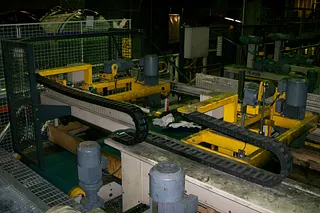
Using the CF5 in practice
The CF5 control cable family is available in an incredible number of core/cross-section combinations. Cross sections of 1.5mm and 2.5mm are very frequently used in indoor cranes to supply buttons, limit switches, motors or simply lamps. On the long travels in the hall, things can get quite strenuous, as there are also travels that can reach over 80 metres. Here, the short pitch length and the cores wound in bundles are very good for a high service life. However, dirt from dust and exhaust fumes also affect the cable in the area of the hall roof and this is where the abrasion-resistant, oil-resistant outer jacket scores highly.
Control cable CF891.25.04
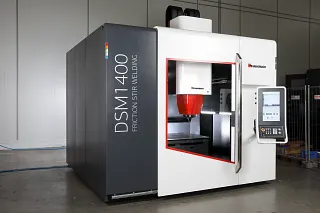
Using the CF891 in practice
The aim of the test was to determine the service life of the chainflex control cable. The CF891 needs to be reliable in continuous movement, for example in machine tools or processing machines. In addition, use in such machines often means that the cable comes into contact with oils. In terms of oil resistance, the outer jacket of the CF891, iguPUR, is particularly noteworthy. This jacket material was developed by igus especially for machine tools. This outer jacket in combination with a tested service life of 14.5 million double strokes makes this control cable a reliable choice for your machine.
Control cable CF9.10.12
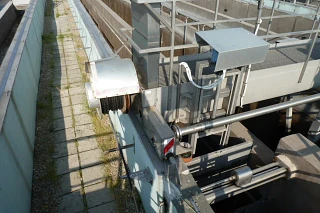
Using the CF9 in practice
At first glance, wastewater treatment plants may not look very sophisticated, as there is often enough space to plan an energy supply with generous dimensions for modern plants. But even with sufficient space, the cables installed in these systems have to withstand adverse weather conditions such as frost, rain and UV radiation from the sun. And ideally, these systems should require as little maintenance as possible despite 24/7 operation. The fact that the TPE outer jacket of the CF9 can withstand temperatures of up to -35°C and UV rays particularly well helps here. Thanks to the gusset-filling extrusion and the cores wound in bundles, the cable also keeps the entire promised service life over long distances of well over 100 metres, which can be achieved with such systems.
Control cable CF9.15.18

Using the CF9 in practice
The aim of the test was to test the service life of the chainflex cable at extremely low temperatures. Cold-resistant cables should be used for systems in outdoor applications. This is because low temperatures are particularly hard on the material - or more precisely, the material of the outer jacket. Such conditions can be found in harbours, e.g. where cables are permanently exposed to harsh environmental conditions. Seawater, large temperature differences and precipitation require the used cables to be weatherproof and UV-resistant as well as robust.
Initiator/Control cable CF77.UL.03.04.INI
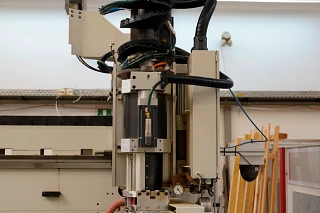
Using the CF77.UL.D in practice
6-axis robots are now an industry standard. The versatile vending machines are already fully integrated in automotive production. Whether welding, gluing, laser cutting or simply gripping is required, the robots rotate and move fully automatically everywhere. It is therefore helpful if the cable for sensors, grippers, motors and much more is just as flexible! The CF77.UL.D is available both as a sensor cable and up to a cross section of 6mm² for controlling motors. Ideal for torsion applications with +/- 180° per metre of cable length, but can also be used for long linear movements, for example in a 7th axis. Thanks to the notched PUR outer jacket, the cable is also durable when things get a little rough or oil is in the clearance.
Consulting
I look forward to answering your questions

Nils Jäger+49 2203 9649 9823Write e-mail
Shipping and consultation
In person
Monday to Friday: 8 am – 8 pm
Saturday: 8 am – 12 pm
Chat-Service
Monday to Friday: 8 am – 5 pm
WhatsApp-Service
Monday to Friday: 8 am – 5 pm